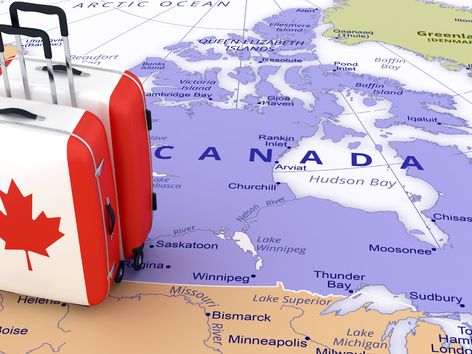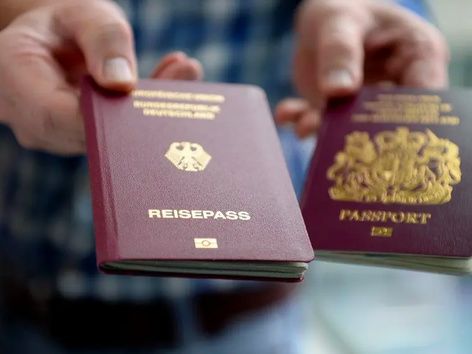Government of Canada announces new immigration projections: what to expect in 2024

The Government of Canada has announced new immigration projections that set the course for the country's immigration policy in 2024. These forecasts cover the volume of new immigrants, as well as the strategies and approaches Canada plans to use to attract and integrate expats. Learn more about the details of these projections and their possible impact on the country's development
Analysing the announcements on immigration to Canada, it can be concluded that the country plans to maintain a stable level of new immigrants until 2024, with an annual rate of 485,000 people. However, after this period, it is planned to tighten its immigration policy, accepting 500,000 new immigrants in 2025 and 2026. Compared to other countries, such as the United States, Canada maintains a more conservative approach, adapting its policy to the conditions of the modern world. This decision demonstrates Canada's desire to attract highly skilled professionals and ensure stability in the immigration process.
Immigration forecasts for Canada
Canada remains among the leaders of the global immigration policy, noting its strategic approach and openness to different categories of immigrants. The Government of Canada has announced that in 2024 it plans to accept approximately 281,135 new immigrants, which is a significant contribution to the overall development of the country.
The greatest emphasis is placed on economic class immigrants. Under the Express Entry program, 110,700 immigrants are planned to be admitted, which is 58% of the annual plan. This approach is recognized as the main way to attract specialists and skilled workers, which will contribute to economic growth and development in various sectors.
The family class remains an important component of immigration policy, and this is reflected in the target of 114,000 expats. Sponsorship of spouses, partners and children aims to reunite families and strengthen Canada's social capital.
The Parents and Grandparents Program (PGP) is marked by a target of 32,000 immigrants, emphasizing the importance of family ties in Canadian society.
On a humanitarian basis, 89,865 immigrants, including refugees and persons in need of protection, are planned to be accepted. This demonstrates Canada's readiness to accept those seeking asylum and protection in the country.
The Provincial Nominee Program (PNP) will provide for the admission of 110,000 immigrants, the distribution of which will be adapted to the needs of each particular province.
The government plans to take measures to recalibrate the number of temporary residence permits, ensuring the flexibility and stability of the immigration system.
Compared to the American immigration policy, which emphasizes family ties, the Canadian system of express entry allows immigrants to be selected based on their potential contribution to the economy and society.
If you are planning a move or a trip to Canada, we recommend using our guides. A guide is a detailed-written document that contains basic tips on obtaining a visa, crossing the border, getting a job, citizenship, and much more. For more information, please follow the link.
Canada's immigration strategy
The new strategy, "An Immigration System for Canada's Future," defines three key goals aimed at ensuring the successful and harmonious development of the country. The first goal is to create a welcoming environment for newcomers, providing them with maximum integration and support.
The second aspect of the strategy is to align the immigration process with the needs of the labour market. This is defined as an important condition for ensuring the effective economic integration of newcomers into Canadian society.
The last goal of the strategy is to develop a comprehensive and coordinated growth plan that provides for careful planning of national development and consideration of the impact of immigration on the socio-economic situation in the country.
It is worth noting that the housing affordability crisis and shortage of housing are challenges noted in polls, which show less enthusiasm among Canadians for immigration. Nevertheless, the Canadian government continues to advocate high immigration targets, in part due to the need for skilled workers in the face of demographic challenges and low birth rates.
The province of Quebec, which has special immigration powers, has presented its plans for the future. Having set a target of 50,000 new immigrants in 2024, Quebec has established a mandatory French language test for all economic immigrants, indicating the importance of the language aspect for successful integration into Quebec society. It is predicted that this new requirement may pose some challenges for immigrants, given the difficult path to fulfil this new criterion.
Priorities of the Canadian government in immigration policy
Canada has presented a detailed immigration strategy that covers a wide range of issues, from technological development to refugee work and support for diverse populations. However, despite the variety of initiatives, the government's priorities remain unclear, and some aspects of the announced strategy were already known from previous publications.
Among the key areas of the strategy are measures aimed at strengthening the technology sector, including open access for H-1B visa holders, which will contribute to the growth of the North American technology industry. It is also worth paying attention to the strategy on digital nomads, which is designed to make Canada more attractive to professionals who want to work remotely and stay in the country for a long time.
However, there is a lack of transparency in the government's plans, especially in terms of specific priorities. Even when large immigration numbers are announced, no comprehensive information is provided on the programs and their priorities. The lack of clear commitments and targets for processing applications leaves doubts about concrete achievements in the field of immigration.
In the context of global challenges, it is also important to pay attention to the growing problem of more than 100 million migrants facing instability and crisis in their home countries. There is no clear international policy to address this problem, and Canada could take a leading role in addressing this issue together with the United States. Measures aimed at developing rural areas and supporting French-speaking immigrants are also recognized as important to ensure the diversity and integration of newcomers into Canadian society.
Daria Rogova, Head of Insurance at Visit World
To move, travel or work safely in a new country, you will need travel insurance. You can apply for an extended policy on our website here.
Products from Visit World for a comfortable trip:
Checklist for obtaining a visa and necessary documents in Canada;
Legal advice on business issues in Canada;
Travel insurance for foreigners in Canada;
Medical insurance all over the world.
More articles on the topic:
Moving to the EU: rules for obtaining a residence permit in France, Germany, Italy, the Netherlands and Spain
The most affordable places to buy real estate abroad in 2024
The most affordable tourist destinations: where to go on holiday in 2024
Flight cancellations in Finland: February strike by airport workers
Romania and Bulgaria will enter the Schengen zone: what changes for travellers?
France is recognised as the most popular tourist destination in 2024
The safest countries in Latin America: a detailed overview
5 travel myths that will stop you from long-term travel
The most dangerous countries in the world to visit in 2024: ranking by Independent
Recommended articles
3 min
Work
The best jobs for successful employment 2024: a detailed guide
In today's world, finding a job requires not only skills and knowledge, but also careful planning and assessment of the labour market. Choosing the right job becomes a key step for a successful career and personal development. Find out more about the most popular vacancies for successful employment in 2024
19 Jan. 2024
More details2 min
For refugees
Women who face violence because of their gender can seek protection in the EU. This judgement provides additional rights and opportunities for victims of gender-based violence. Recognising gender-based violence as a ground for refugee status is an important step in protecting women's rights and avoiding violence. Read more about the latest judgement of the European Court of Justice
20 Jan. 2024
More details1 min
Travels
The Schengen area, a symbol of free travel within Europe, is preparing to expand. According to official reports, Romania and Bulgaria will join the visa-free zone from January 1, 2025. This decision will allow people to travel freely without passport control at internal borders with other members of the zone. Find out how such innovations could affect tourists and what benefits you can expect
17 Dec. 2024
More details2 min
Residence permit
Law on citizenship in Germany: the procedure for issuing a passport has been eased in the country
The German authorities have adopted amendments to the law on citizenship that change the rules for acquiring dual citizenship and reduce the timeframe for migrants' right to naturalization. Find out more about how the procedure for obtaining German citizenship in 2024 was simplified, what are the requirements for applicants and when the approved changes will come into force in Germany
22 Jan. 2024
More detailsAll materials and articles are owned by VisitWorld.Today and are protected by international intellectual property regulations. When using materials, approval from VisitWorld.Today is required.
